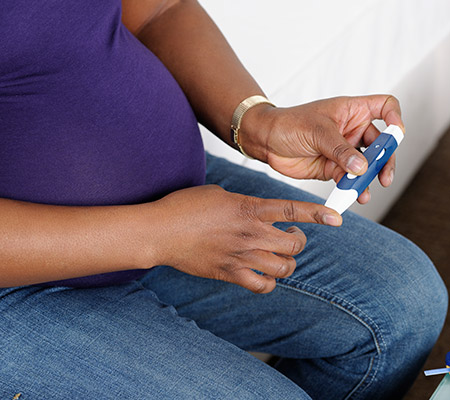
You will have to check your blood sugar levels every day if you are diagnosed with gestational diabetes.
Women go through many changes during pregnancy, including changes in how their bodies process insulin.
Pregnancy causes your body to become more insulin resistant. This isn’t a problem for most expectant mothers. Exercise and a healthy diet reduce your risk of developing gestational diabetes, but some women experience high blood sugar levels during pregnancy.
“The main risk of gestational diabetes is having a larger than normal baby,” said Dr. Gregory Tyler, a Marshfield Clinic OB-GYN physician. “That can lead to a more complicated delivery and increase the likelihood you’ll need a C-section. Sometimes there are abnormal changes in the baby’s blood glucose levels after delivery.”
It’s important to manage gestational diabetes for the safety of the baby and expectant mother.
Testing takes place in the second trimester
Pregnant women are tested for gestational diabetes at 26-28 weeks. Your doctor may test you early if you have risk factors like previous history of the condition, family history of Type 2 diabetes or elevated body mass index.
The test, called the glucose challenge, involves drinking a sugary solution and having your blood sugar checked an hour later. You’ll need more testing if your results are above normal.
Lifestyle changes are the first choice treatment
If you’re diagnosed with gestational diabetes, you’ll immediately get connected with nutrition counseling to help you find ways to lower blood sugar levels through diet,” Tyler said.
Diet and exercise are enough to keep most women in a safe range without medication. Your doctor will prescribe pills to lower your blood sugar if lifestyle changes don’t work. The next step is insulin injections in the most challenging cases.
You’ll need to check your blood sugar levels while fasting and two hours after eating every day for the rest of your pregnancy. You’ll see your doctor more frequently to make sure you and your baby are doing well. You may undergo ultrasounds and nonstress tests to monitor the baby’s movement and heart rate.
Risk increases for Type 2 diabetes after pregnancy
Most women’s glucose levels return to normal two to six weeks after the baby is born.
“Depending on the severity of gestational diabetes, we’ll check fasting and two-hour glucose levels after delivery to make sure everything is returning to normal,” Tyler said.
However, women’s bodies don’t always return to processing insulin normally after pregnancy. Women who have gestational diabetes are at a slightly increased risk of developing adult onset diabetes. They’re also at increased risk for gestational diabetes in future pregnancies. You can reduce the risk by eating balanced meals, exercising and maintaining a healthy weight.
Related Shine365 posts
Pregnancy diet do’s and don’ts
Prenatal exercise: Is your fitness routine safe?
Second trimester tips: Get ready to feel your baby move

